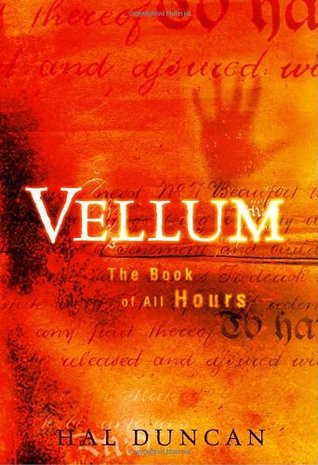 For a very long time, I thought I would never finish this book. I've had it for close to a decade, I'd say, and never got much more than halfway through it. It's a strange book, which is the main reason why, and looking at reviews I can see that a lot of other people have had a lot of frustration with it, too. But I picked it back up recently to fulfill the Popsugar Reading Challenge category of "A book you started but never finished." This certainly fulfilled that category for me, but it meant I had to finish Vellum this time around if it was going to count. And I did. And I liked it.
For a very long time, I thought I would never finish this book. I've had it for close to a decade, I'd say, and never got much more than halfway through it. It's a strange book, which is the main reason why, and looking at reviews I can see that a lot of other people have had a lot of frustration with it, too. But I picked it back up recently to fulfill the Popsugar Reading Challenge category of "A book you started but never finished." This certainly fulfilled that category for me, but it meant I had to finish Vellum this time around if it was going to count. And I did. And I liked it.I think this is a book I really needed to come back to with a fresh pair of eyes. Here's the thing: the book doesn't actually really make much sense. There are a lot of timelines and a lot of characters, many of whom have the same names, but who don't always resemble each other a lot. There are a lot of worlds and a lot of weird things in those worlds. It all has to be looked at through the right lens in order to make sense, and I think I finally found that lens. I call it the Cloud Atlas lens. For those of you that haven't read Cloud Atlas, it's a bunch of different narrative styles that are patched together, one half of each and then the other halves in reverse order, that follow people who, as you eventually realize, are all the same people, throughout different lives in different times. Vellum is like that, on a bigger scale. Not only are these people the same people, through different times, but they're also different versions of the same people, in different worlds that are each a step different from our own, until they're getting weirder and weirder and farther and farther apart from our own reality. All of these worlds are arrayed on a sort of meta-world called the Vellum, and characters escape to and travel across the Vellum for various reasons, looking for various things. And these people can be changed by re-writing the coding of their own souls. Phreedom/Anna/Imana is looking for her brother, Thomas. Finnan is tied up in them because he made them unkin, immortal, able to do things like travel through the Vellum. And then there's Metatron, one of the highest unkin, an "angel," who helps to lead the Covenant, which is sort of a banding together of unkin who want a certain type of order, against another bunch of unkin who want a different sort of order. Metatron thinks Finnan and Thomas and Phreedom have something he wants, and so he and his lackeys are hunting them down--all while the end of the world swirls around them.
The farther into the book, the more things begin to come together, but I admit that it does take a long time for that to happen--and some things never come together as much as the others. The prologue, for example, never really actually ties in with the rest. Its events and narrator pop up throughout the "Errata" sections now and then, but they never link up with the Phreedom/Thomas/Finnan/Metatron story, which is really the main story. Some story- and timelines are also more compelling than others. I found the World War I story, for example, utterly boring, even though I get that it was important for Finnan's origins. The part I probably found the most interesting was the bits about the archaeological expedition to find Kur and the source of the Cant, which is a sort of language that can change reality. There are also some really weird stylistic choices with this book, and I have no idea what book stylist in his (or her) right mind agreed to set up a book with all of those stupid line breaks. They're completely unnecessary and come across as someone trying to be more "arty" than the book actually calls for. The different fonts I understood--they help distinguish the different lines when the sections sometimes appear intertwined with each other. But the line breaks? Completely stupid. They appear what seems to be randomly, probably to make things seem more dramatic than they actually are.
I really enjoyed this. I can see, however, why many people didn't, and also why I didn't in the past. I think you really have to like stories about different versions of the same souls, different iterations of the same people, in order to like this, and you have to be willing to soldier on through a lot of weirdness in order to get to the parts that make sense. I was willing to do that this time, and I think it paid off. I'll definitely be reading the second part, Ink. But this is definitely a love it or hate it type of book, and it's not for everyone.
4 stars out of 5.
No comments:
Post a Comment